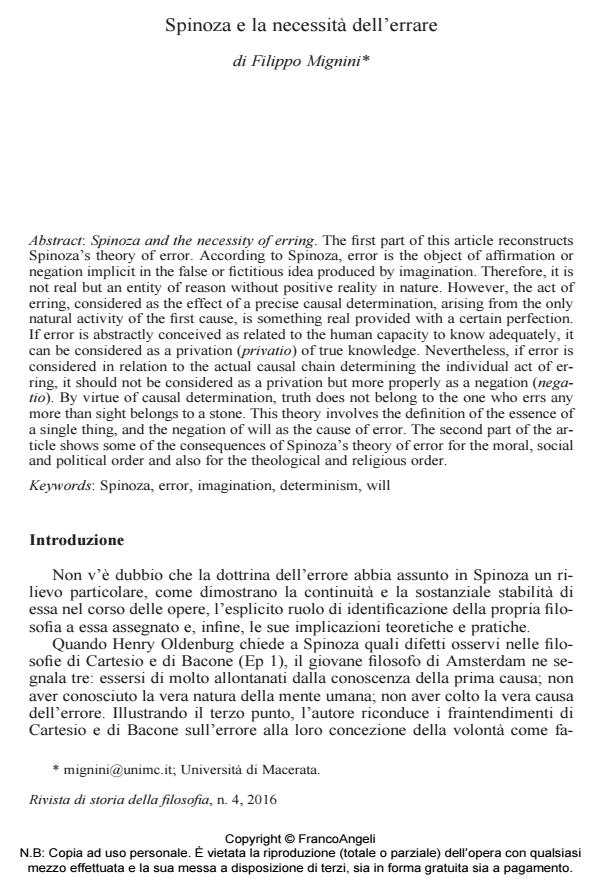Spinoza and the necessity of erring
Journal title RIVISTA DI STORIA DELLA FILOSOFIA
Author/s Filippo Mignini
Publishing Year 2016 Issue 2016/4
Language Italian Pages 19 P. 693-711 File size 61 KB
DOI 10.3280/SF2016-004009
DOI is like a bar code for intellectual property: to have more infomation
click here
Below, you can see the article first page
If you want to buy this article in PDF format, you can do it, following the instructions to buy download credits

FrancoAngeli is member of Publishers International Linking Association, Inc (PILA), a not-for-profit association which run the CrossRef service enabling links to and from online scholarly content.
The first part of this article reconstructs Spinoza’s theory of error. According to Spinoza, error is the object of affirmation or negation implicit in the false or fictitious idea produced by imagination. Therefore, it is not real but an entity of reason without positive reality in nature. However, the act of erring, considered as the effect of a precise causal determination, arising from the only natural activity of the first cause, is something real provided with a certain perfection. If error is abstractly conceived as related to the human capacity to know adequately, it can be considered as a privation (privatio) of true knowledge. Nevertheless, if error is considered in relation to the actual causal chain determining the individual act of erring, it should not be considered as a privation but more properly as a negation (negatio). By virtue of causal determination, truth does not belong to the one who errs any more than sight belongs to a stone. This theory involves the definition of the essence of a single thing, and the negation of will as the cause of error. The second part of the article shows some of the consequences of Spinoza’s theory of error for the moral, social and political order and also for the theological and religious order.
Keywords: Spinoza, error, imagination, determinism, will
- - Bertrand 1983: Michèle Bertrand, Spinoza et l’imaginaire, PUF, Paris 1983.
- - Cristofolini 1985: Paolo Cristofolini, Studi sul Seicento e sull’immaginazione, Scuola Normale Superiore di Pisa, Pisa 1985.
- - Laux 1994: Henri Laux, Imagination et religion chez Spinoza. La “potentia” dans l’histoire, Vrin, Paris 1993.
- - Mignini 1981: Filippo Mignini, “Ars imaginandi”. Apparenza e rappresentazione in Spinoza, ESI, Napoli 1981.
- - Mignini 1997: Id., Les erreurs de Bacon sur l’intellectus, selon Spinoza, «Revue de l’enseignement philosophique» 47 (1997), 6, pp. 23-30s.
- - Mignini 2015: Id., Fictio/Verziering(e) in Spinoza’s early writings, in The Young Spinoza. A Metaphysician in the Making,, ed. by Yitzhak Melamed, Oxford University Press, New York 2015, pp. 33-51.
- - Sangiacomo 2013: Andrea Sangiacomo, L’essenza del corpo. Spinoza e la scienza delle composizioni, Olms, Hildesheim-Zürich-New York 2013.
- - Scribano 2015: Emanuela Scribano, Macchine con la mente. Fisiologia e metafisica tra Cartesio e Spinoza, Carocci, Roma 2015.
- - Spinoza [1925]: Baruch Spinoza, Opera, Hrsg. Carl Gebhardt, Winters, Heidelberg [1925].
- - Spinoza 1999: Id., Oeuvres (Édition publiée sous la direction de Pierre-François Moreau) III, Tractatus theologico-politicus/ Traité théologico-politique, Texte établi par Fokke Akkerman, Traduction et notes par Jaqueline Lagrée et Pierre-François Moreau, PUF, Paris 1999.
- - Spinoza 2005 : Id., Oeuvres (Édition publiée sous la direction de Pierre-François Moreau), V, Tractatus politicus/ Traité politique, Texte établi par Omero Proietti, Traduction, introduction, notes, glossaires, index et bibliographie par Charles Ramond, PUF, Paris 2005.
- - Spinoza 2007: Id., Opere, a cura e con un saggio introduttivo di Filippo Mignini, traduzioni e note di Filippo Mignini e Omero Proietti, Mondadori (I Meridiani), Milano 2007.
- - Spinoza 2009 : Id., Oeuvres (Édition publiée sous la direction de Pierre-François Moreau), I, Premiers écrits, Introduction générale par Pierre-François Moreau, Tractatus de intellectus emendatione/Traité de la réforme de l’entendement, texte établi par Filippo Mignini, traduction par Michelle Beyssade; Korte Verhandeling/Court Traité, texte établi par Filippo Mignini, traduction par Joël Ganault, PUF, Paris 2009.
- - Vinciguerra 2005: Lorenzo Vinciguerra, Spinoza et le signe. La genèse de l’imagination, Vrin, Paris 2005.
- Spinoza e le sei storie di Adamo: teoria della narrazione e polisemia dei testi Marta Libertà De Bastiani, in RIVISTA DI STORIA DELLA FILOSOFIA 4/2023 pp.684
DOI: 10.3280/SF2022-004004
Filippo Mignini, Spinoza e la necessità dell’errare in "RIVISTA DI STORIA DELLA FILOSOFIA" 4/2016, pp 693-711, DOI: 10.3280/SF2016-004009